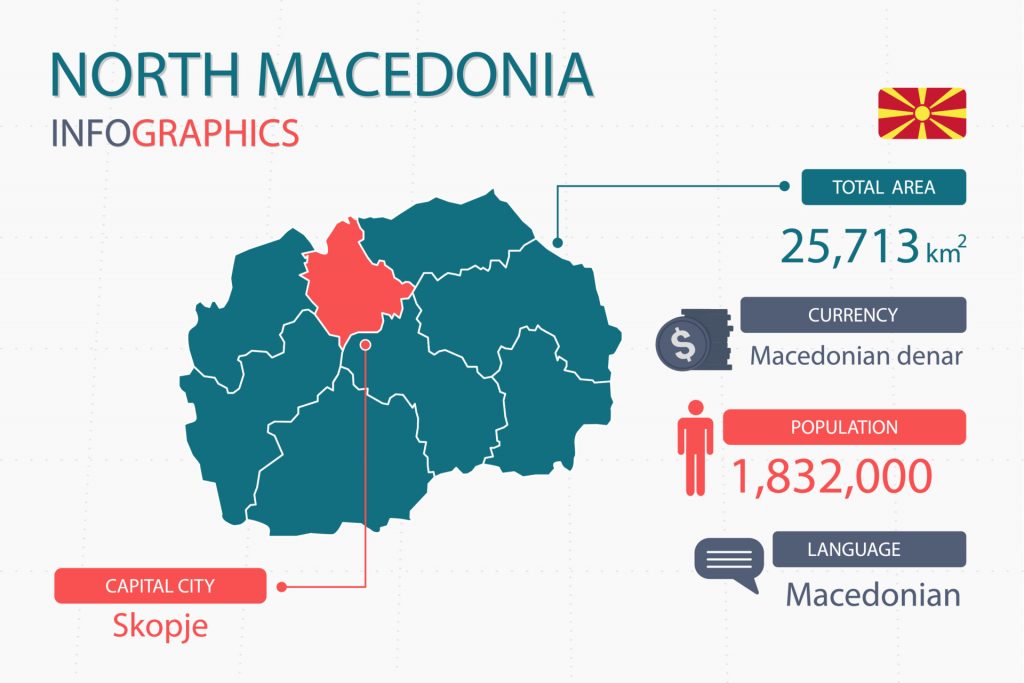The origins of the Macedonian Language
Macedonian is the official language of Macedonia as well as a recognized minority language in Serbia, Albania, and Romania. In addition to being spoken in these countries, it is used by the Macedonian diaspora throughout the world. The number of speakers varies according to the source, but there are approximately 1.4 to 2.5 million speakers.
Macedonian has a complex but very close relationship with Bulgarian, and its name as a separate language is contested in both Bulgaria and other countries. In fact, Macedonian dialects were once, and at times still is, described as a dialect of Bulgarian. Most scholars and the general public in Bulgaria would consider Macedonian a Bulgarian dialect. In addition, the name Macedonian to signify the language is not used in Greece, albeit for a different reason. In Greece, while Macedonian is spoken in the Macedonia region of Greece, the term Macedonian Slavic is preferred.
The modern Macedonian alphabet is rather a recent invention, having been developed after World War II. Previously, it had been written using different versions of the Cyrillic alphabet. Before its inception, different writers from Macedonia would use different versions of Cyrillic, as well as a variety of spelling conventions, as not standard had been set yet. Drawing on its Cyrillic roots, the Modern Macedonian alphabet was also adapted from the Cyrillic script and was standardized by a special committee formed in 1945. The current alphabet is written from left-to-right and also contains a cursive form.
Macedonian grammar might be difficult for those more used to English. For example, Macedonian nouns are categorized into three genders and there is a case system. However, similarly to English and many other Western languages, the word order is subject-verb-order, even though, again like other languages, the word order is quite flexible.
As Macedonian is considered a South Slavic language, its history can be traced back to the Slavonic dialects spoken during the sixth and seventh centuries. These dialects were quite close in terms of their characteristics; they had not been separated into distinct languages yet. The early Slavonic dialects gave way to Old Church Slavonic, originally a liturgical language. In addition, though, a vernacular form of it had emerged and was used by the general populous in the Slavic regions, bringing its usage outside of a religious context.
Macedonian dialects were originally described as Bulgarian, hence the close relationship and controversy with Bulgarian. In the 16th century, a lot of work produced by Greek scholars also described Macedonian dialects as part of Bulgarian. Even written works that appeared in the 18th and 19th century that were produced in Macedonia referred to their own language as Bulgarian. Such precedent is the basis of the argument that Macedonian is a mere dialect of the Bulgarian language as opposed to a separate language.
It is only thanks to Viktor Grigorovich, a Russian linguist who studied Slavic languages in Macedonia, that separate Bulgarian dialects were identified and subsequently classified as distinct languages. Descriptions of their characteristics were produced arguing for their linguistic uniqueness, paving the way for a clearer partitioning of the languages. Other Russian linguists also made cases for the Macedonian dialects, stating that they were distinct from Bulgarian in fundamental ways, and thus constituted a separate language.

Political and cultural forces then played a role in shaping the evolution of the Macedonian language. After the first two wars that took place in the Balkans, Macedonia was divided between Serbia, Greece, and Bulgaria. In the Serbian territory, Serbo-Croatian was the language to be used in public. In the Greek and Bulgarian regions, the languages of those two countries held official status. In all three regions, Macedonian was not a recognized language. Especially in Bulgarian Macedonian, Macedonian dialects continued to be defined as part of the overall Bulgarian language.
During World War II, Bulgarian also gained control of the Macedonian areas that were previously under Serbian control. Linguistic policies introduced Bulgarian as an official language for both education and religion. Most Macedonians welcomed this change as they saw the Bulgarian forces as liberators, even though some wanted a stronger Macedonian identity to be formed and protected.
Eventually, after the Republic of Macedonia was formed, Macedonian was recognized as an official language in 1944. Shortly after, a Macedonian grammar was written and a Macedonian literary language also emerged as distinct from the other languages in the region. The standardization and recognition of the language is relatively recent in the history of world languages in general. For example, the First Macedonian newspaper was published in 1946. The ‘newness’ of the language also contributes to the controversy surrounding its name and recognition. Recently, It is used in public education in Macedonia and seventy percent of those in Macedonia consider it their native language.
Nowadays, Macedonian is spoken throughout the Balkans in Europe as well as in other areas of the world. For example, it is used in some areas in Albania, Serbia, and Kosovo, where ethnic Macedonian communities exist. It also exists in Greek Macedonia, a region in Greece. However, it is not called Macedonian in Greece, but rather Macedonian Slavic. Other countries with Macedonian communities include the US, Switzerland, Italy, Canada, and Australia. An understanding of Macedonian’s interaction with the other languages in the region, and its recently found prestige as a national language is important in recognizing it as a language that still plays a crucial role in worldly affairs.
VEQTA can provide you with a perfect Macedonian translator for your Macedonian translation, English to Macedonian translation and Macedonian to english translation for the your targeted locale. Our translations to Macedonian are created with your target audience in mind to meet your expectations.
If you need to translate Macedonian – Get in touch today!
A dedicated team of Macedonian translators who combines Experience, Specialized Subject Matter Expertise with Translation Practices to deliver quality second to none.
Macedonian Subject Expertise
Macedonian Translators
Macedonian Editors
Macedonian Copywriters
Macedonian Reviewers
Macedonian Voice dubbing
Macedonian Subtitling
Macedonian Transcription


